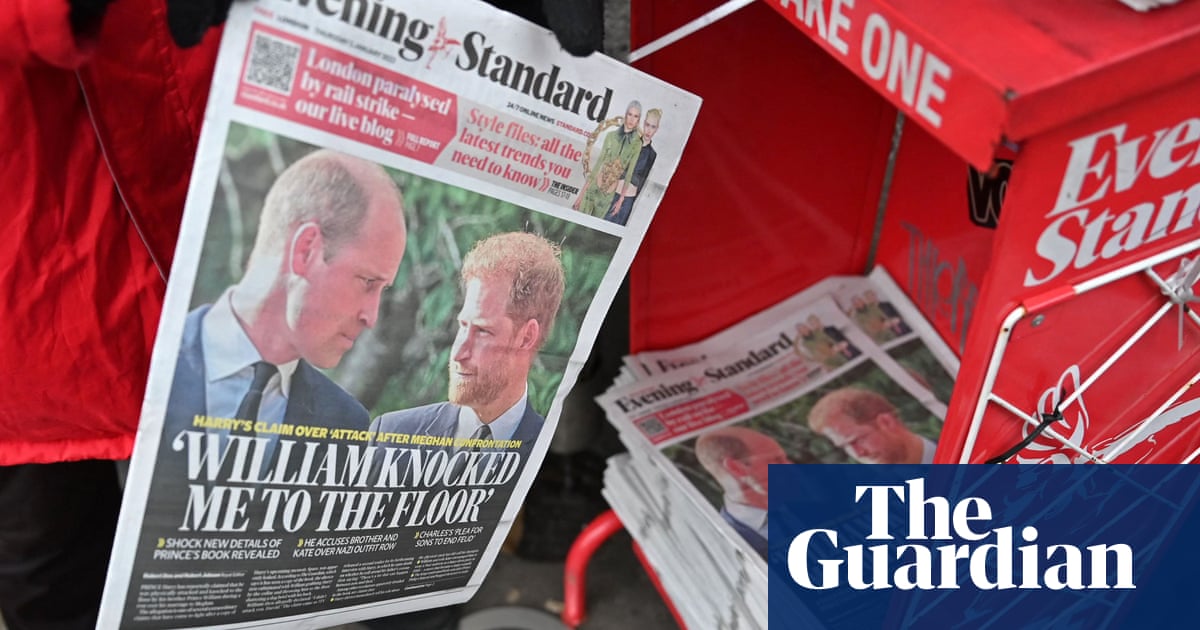London’s Evening Standard has announced plans to shut its daily newspaper and replace it with a new weekly outlet, bringing an end to almost 200 years of publication in the capital.
The newspaper said it has been hit hard by the introduction of wifi on the London underground, a shortage of commuters owing to the growth of working from home and changing consumer habits.
The Standard lost £84.5m in the past six years, according to its accounts, and is reliant on funding from its part-owner Evgeny Lebedev. Its other shareholders include a bank with close links to the Saudi government. Industry sources suggested Lebdev had been willing to consider selling the outlet in recent years but no buyer was found.
Paul Kanareck, the newspaper’s chair, told staff on Wednesday morning: “The substantial losses accruing from the current operations are not sustainable. Therefore, we plan to consult with our staff and external stakeholders to reshape the business, return to profitability and secure the long-term future of the number one news brand in London.”
He said the company planned to launch “a brand new weekly newspaper later this year and consider options for retaining ES Magazine with reduced frequency”, with the focus shifting to increasing its website audience.
Kanareck said there would be an “impact on staffing”, with journalists bracing themselves for further job losses on top of years of redundancies, while design staff on the print edition are expected to be hit hard. Distributors who hand out the newspaper across London are also likely to be out of work, and billboards outside railway stations advertising the day’s headline will stand empty on most days.
He suggested there would be a change in focus for the new outlet: “A proposed new weekly newspaper would replace the daily publication, allowing for more in-depth analysis of the issues that matter to Londoners, and serve them in a new and relevant way by celebrating the best London has to offer, from entertainment guides to lifestyle, sports, culture and news and the drumbeat of life in the world’s greatest city”.
Before the Covid pandemic the Evening Standard distributed more than 600,000 copies a day across London, but the latest figures show this is now just 275,000 copies a day. The cost of paper has also rocketed in recent years, with the outlet responding by cutting the numbers of pages it publishes.
Closing the Evening Standard will mean that for the first time in centuries, Londoners will have no general-interest daily print newspaper. The finance-focused City AM, which was recently saved by the billionaire Matthew Moulding, will continue publish four days a week and has recently increased its distribution.
The Evening Standard used to be a paid-for newspaper publishing multiple editions a day, ensuring Londoners had the latest news throughout the afternoon. It suffered in the 2000s as mobile phones became the norm, and rival publishers engaged in the chaotic “freesheet wars”.
The newspaper was sold to the Lebedev family for £1 in 2009 and turned into a freesheet, reviving its finances under the editorship of Geordie Greig. It enthusiastically backed Boris Johnson for mayor of London, even running a front-page endorsement of the Tory politician under the editorship of Sarah Sands. Johnson later arranged a peerage for Evgeny Lebedev.
after newsletter promotion
The Evening Standard’s politics have sometimes been at odds with an increasingly Labour-voting city. In recent years its editors have included the former Conservative chancellor George Osborne and Emily Sheffield, the sister-in-law of the current foreign secretary, David Cameron.
Dylan Jones, the current editor, was previously GQ magazine editor and wrote a book about Cameron.
The newspaper endorsed Labour’s Sadiq Khan in the last mayoral election.







